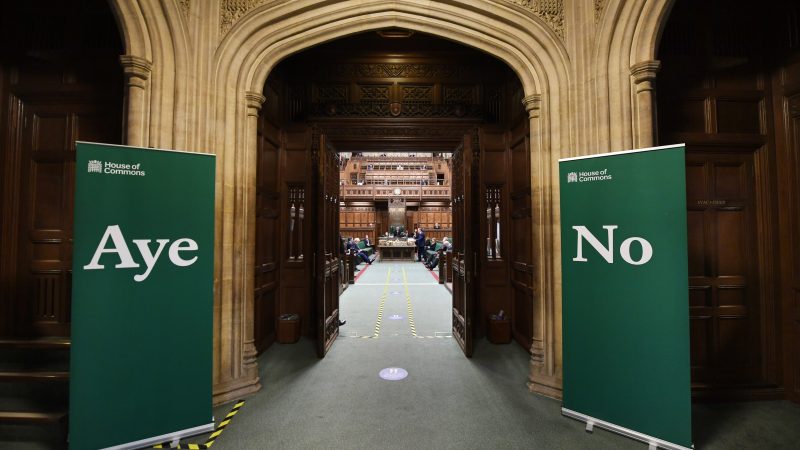
23 Labour MPs have voted against the government’s 10pm hospitality curfew as the legislation was passed in the House of Commons by a majority of 217 with 82 voting against the Covid restriction.
Backbench Labour MPs were given a free vote on the issue this evening following growing opposition to the measure among the Parliamentary Labour Party. Those on the frontbench were whipped to abstain.
Jeremy Corbyn, Ian Lavery, Rebecca Long-Bailey, Diane Abbott, Apsana Begum, Bell Ribeiro-Addy, Dawn Butler, Chris Bryant and others joined with the Lib Dems, the DUP, Green MP Caroline Lucas and 42 Tory rebels in voting against.
Jonathan Ashworth set out Labour’s position on the measure, arguing that if the country cannot close schools, workplaces or shops, or shut down public transport to slow the spread, “the only lever we have is hospitality”.
He told MPs this afternoon: “We therefore support the announced measures, difficult as they are. Indeed, we support the measures aimed at constraining the time people can spend in the pub.”
But the Shadow Health Secretary added: “We will not stand in the way of the passing of the statutory instrument, but if the House’s procedures had allowed it, we would have proposed an amendment to implement the Welsh scenario.”
A statutory instrument is a secondary piece of legislation, in this case used to amend government Covid regulations, and MPs cannot amend them. This meant MPs could only vote for or against everything in the statutory instrument this evening.
While making provision for the opening hours restrictions, the vote also therefore related to other public health measures introduced in the pandemic such as requiring customers to remain seated while at hospitality venues.
The Welsh government has imposed a 10pm drinking-up time, rather than forcing businesses to expel customers from their premises all at the same time, with off-licence sales also banned after the early closing time.
Labour leader Keir Starmer had already announced last week that Labour would not oppose the 10pm closing time. He argued that “if you vote down the current arrangements, there won’t be any restrictions in place”.
The government saw opposition from its own MPs on the statutory instrument. Along with 42 Tories joining opposition MPs to vote against, Conservative Chris Green resigned his post as parliamentary private secretary this afternoon.
In a letter to the Prime Minister, he wrote: “I now believe the attempted cure is worse than the disease… I believe there are better alternatives to the government’s approach, so I therefore tender my resignation.”
MPs voted to renew the emergency powers granted to the government under the Coronavirus Act in March, which introduced extraordinary measures in the pandemic, at the end of last month.
In an attempt to prevent a full-scale rebellion within the Tories, Health Secretary Matt Hancock said MPs would have a say on national restrictions and “votes wherever possible”, resulting in retrospective votes such as the one this evening.
MPs voted to keep the ‘rule of six’ measures in place last week. Labour at the time called for transparency on the evidential basis behind the restrictions, but the party proceeded to abstain on the vote.
The Labour leader has now called on the government to implement a ‘circuit break’ lockdown following reports that ministers ignored advice from experts to implement the nationwide measure to combat the spread of the virus.
Addressing the public this afternoon in his first televised press conference as Labour leader in response to Boris Johnson’s own appearance on Monday, Starmer warned that the country could “sleep walk into a long and bleak winter” without action.
The Scientific Advisory Group for Emergencies warned the government three weeks ago that the country faced a “very large epidemic with catastrophic consequences” unless it took urgent action and implemented the national measure.
Official papers dated 21st September were released just one hour after the Prime Minister concluded his TV press briefing on Monday, documenting the stark warning from the government experts.
Based on the current rate of growth in infections, SAGE has estimated that there could be as many as 3,000 hospital admissions per day by the end of the month, the same as during the peak of the pandemic in April.
Below is the full list of Labour MPs who voted against.
Diane Abbott
Apsana Begum
Ben Bradshaw
Chris Bryant
Dawn Butler
Jeremy Corbyn
Geraint Davies
Andrew Gwynne
Mike Hill
Rupa Huq
Kevan Jones
Ian Lavery
Emma Lewell-Buck
Rebecca Long Bailey
Ian Mearns
Grahame Morris
Kate Osborne
Bell Ribeiro-Addy
Lloyd Russell-Moyle
John Spellar
Graham Stringer
Jon Trickett
Derek Twigg




More from LabourList
‘Unity or division’: Starmer’s message to voters in Gorton and Denton
Almost half of Labour members oppose plans to restrict jury trials, poll finds
‘How Labour can finally fix Britain’s 5G problem’